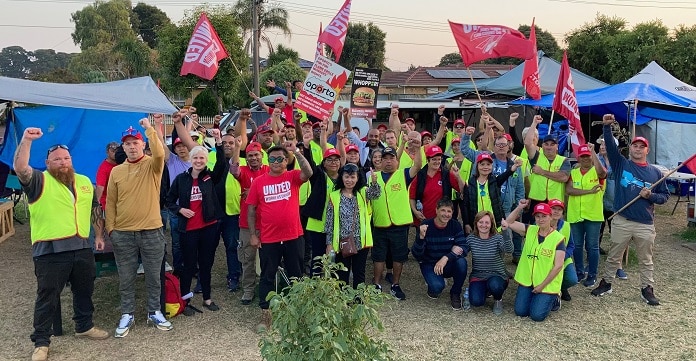Workers at the McCormick factory in Melbourne have scored a tremendous victory, beating back their multinational employer after six weeks on strike.
As one striker told Solidarity: “We got everything we wanted without losing anything. It took us six weeks but we finally got what we deserved.”
The 71 members of the United Workers Union fought off management attempts to change their shift pattern from a four-day, 40-hour week to a five-day week.
Management capitulated on 7 April, conceding:
- no changes to conditions
- a 9 per cent pay rise across three years
- a $5000 sign-on bonus
The factory in Clayton South makes the sauces and spices for fast food giants including McDonald’s, KFC, Hungry Jacks and Nandos, plus supermarket products like Aeroplane jelly.
The workers have not had a pay rise in five years, despite the US parent company posting a $US747 million profit last year.
At a series of mass meetings on 7 April, the strikers were in tremendous spirits as negotiators reported that management had dropped any changes to conditions.
They stood firm on the final element of the deal, the sign-on bonus. Management’s first offer was a pathetic $1500.
One worker called out: “Let’s stick by our guns.” Another pointed out: “They can afford it.” By late afternoon, management had conceded.
Leading to victory
There are three main factors that led to victory.
First and most importantly, the workers stood absolutely united. Many of them have worked at McCormick for 15 or 20 years, with experience of strikes there and elsewhere. Being at the picket line felt like visiting one big family.
Workers maintained the picket 24 hours a day, with men and women sharing the cooking and cleaning. The picket brought the multicultural workforce together.
A week earlier, all union members and a number of non-union members voted down a management offer that would have ended the four-day week and cost workers hundreds of dollars.
As one worker said: “They’re giving us a pay rise on the one hand, but then taking back a shitload on the other.”
Second, the strikers won solidarity. An online strike fund raised more than $78,000. Even more could have been raised if the UWU had arranged for workplace collections.
The union organised a series of solidarity events addressed by high-profile speakers including Labor leader Anthony Albanese, Labor MP Tanya Plibersek, and Michele O’Neil and Sally McManus from the ACTU.
The VIP treatment reflected the fact that both Labor and the ACTU saw the dispute mainly as an opportunity to bash the Liberals over low wages.
There was support on the picket line from Victorian Trades Hall Council and a range of unions, including ETU, IEU, ASU, CPSU, RAFFWU, VAHPA, MEAA and MUA.
Third, management was vulnerable, despite their early hard line. The factory is the only one in Australia and by the end of the dispute, according to strikers, production was down to 20 per cent of normal and the warehouse was emptying.
In addition, management wanted to increase production by adding a night shift. They attempted to do it on the cheap by forcing workers on to a five-day week but ultimately they wanted greater production more than they wanted cost-cutting.
The UWU has agreed to a night shift of 12 workers, with any additional crews by mutual agreement. Importantly, the new workers will be covered by the enterprise agreement – meaning McCormick workers should be able to increase union membership.
Lessons for future
Despite the victory, there were weaknesses that union activists can learn from.
There was no attempt to stop trucks entering or leaving the site. A serious attempt to control the gates, which would have meant defying the law, would have brought management to heel much sooner.
Solidarity from other unions was largely confined to appearances by officials and organisers. Mobilisation of workplace delegations would have laid the ground for bigger turnouts on mass pickets.
The McCormick distribution centre at nearby Moorabbin worked throughout the dispute – covered by a separate, inferior EBA which had conceded the five-day week.
None of this takes away from a clear-cut and important victory.
The McCormick strikers have shown workers around Australia that there is an alternative to copping low or zero pay rises.
They chanted “Union, power” and “One day longer, one day stronger” – and they meant it.
By sticking together and slowly strangling the bosses’ flow of production and profits, they defended their conditions and won a decent pay rise.
We need to see that fighting spirit rebuilt in workplaces around the country.
By David Glanz






